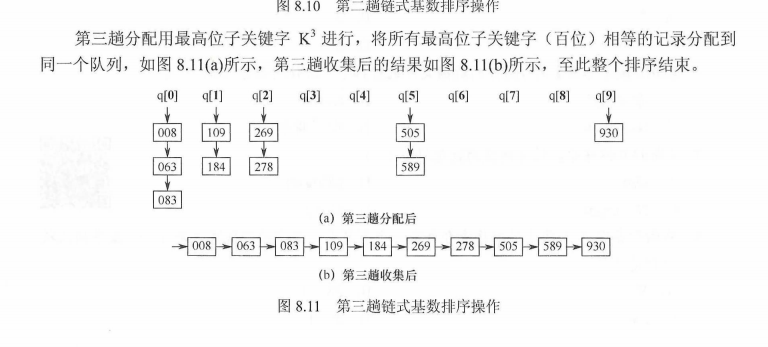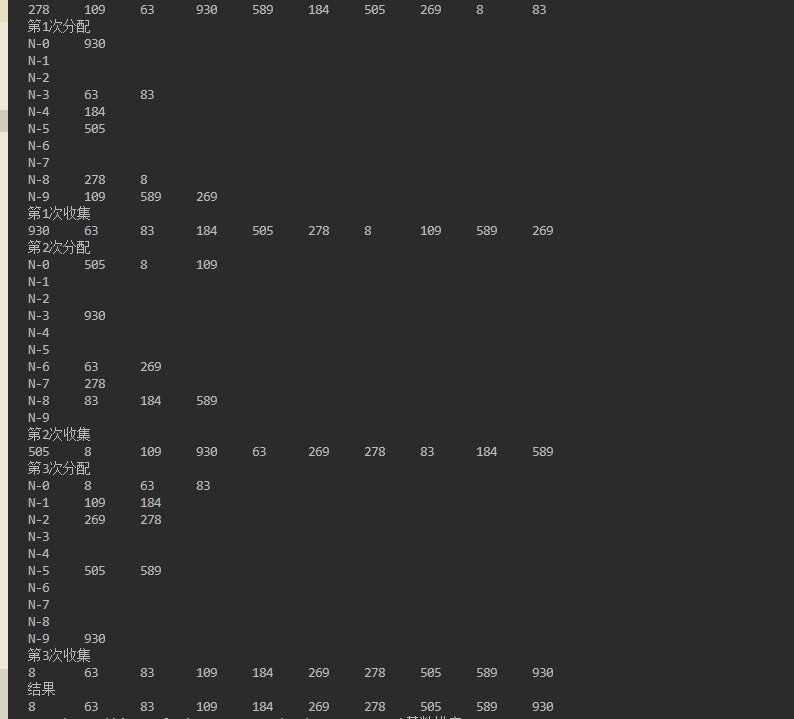王道数据结构 (23) 基数排序



示例代码 :
/** * 基数排序-单链表实现 */ #include <stdio.h> #include <stdlib.h> #include <time.h> #define Error(Str) FatalError(Str) #define FatalError(Str) fprintf(stderr, "%s\n", Str), exit(1) #define N 10 //数个数 #define RADIX 10 //基数 #define POS_LEN 3 //位长 typedef struct Node { int data; struct Node *next; } * pNode; typedef pNode LNode; pNode create(); int get_num_pos(int num, int pos, int radix); void radix_sort(pNode collect, int radix, int pos_len); void append_node(pNode L, int num); void insert(pNode P, int num); void delete_list(pNode L); void test(); void print(pNode L); int main(void) { test(); return 0; } void radix_sort(pNode collect, int radix, int pos_len) { // collect assign LNode assign[radix - 1], P, tmp, p; int i, num; for (i = 0; i < radix; i++) { assign[i] = create(); } for (i = 1; i <= pos_len; i++) { P = collect; while (NULL != P->next) { p = P->next; P->next = p->next; p->next = NULL; int num = get_num_pos(p->data, i, radix); tmp = assign[num]; while (NULL != tmp->next) { tmp = tmp->next; } tmp->next = p; } printf("第%d次分配\n", i); for (int j = 0; j < radix; j++) { printf("N-%d\t", j); print(assign[j]); } //assign P = collect; for (int j = 0; j < radix; j++) { LNode phead; phead = assign[j]; while (NULL != phead->next) { p = phead->next; phead->next = p->next; p->next = NULL; P->next = p; P = P->next; } } printf("第%d次收集\n", i); print(collect); // 置空 // for (int j = 0; j < radix; j++) { // delete_list(assign[j]); // } } // free space for (i = 0; i < radix; i++) { delete_list(assign[i]); } } int get_num_pos(int num, int pos, int radix) { int temp = 1, i; for (i = 0; i < pos - 1; i++) temp *= radix; return (num / temp) % radix; } void insert(pNode P, int num) { pNode temp; temp = (pNode)malloc(sizeof(struct Node)); if (NULL == temp) FatalError("out of space"); temp->data = num; temp->next = NULL; P->next = temp; } void append_node(pNode L, int num) { pNode temp, P; P = L; temp = (pNode)malloc(sizeof(struct Node)); if (NULL == temp) FatalError("out of space"); temp->next = NULL; while (NULL != P->next) { P = P->next; } P->next = temp; } pNode create() { pNode L; L = (pNode)malloc(sizeof(struct Node)); if (NULL == L) FatalError("out of space"); L->next = NULL; return L; } void delete_list(pNode L) { pNode P, temp; P = L->next; L->next = NULL; while (NULL != P) { temp = P->next; free(P); P = temp; } } void print(pNode L) { pNode P; P = L->next; while (NULL != P) { printf("%d\t", P->data); P = P->next; } printf("\n"); } void test() { pNode source, tmp, P; int arr[N] = { 278, 109, 63, 930, 589, 184, 505, 269, 8, 83}; int i; int max = 1; for (i = 0; i <= POS_LEN - 1; i++) max *= RADIX; source = create(); P = source; srand((unsigned)time(NULL)); for (i = 0; i < N; i++) { insert(P, arr[i]); P = P->next; } print(source); radix_sort(source, RADIX, POS_LEN); printf("结果\n"); print(source); }
运行结果 :

越努力越幸运


 浙公网安备 33010602011771号
浙公网安备 33010602011771号